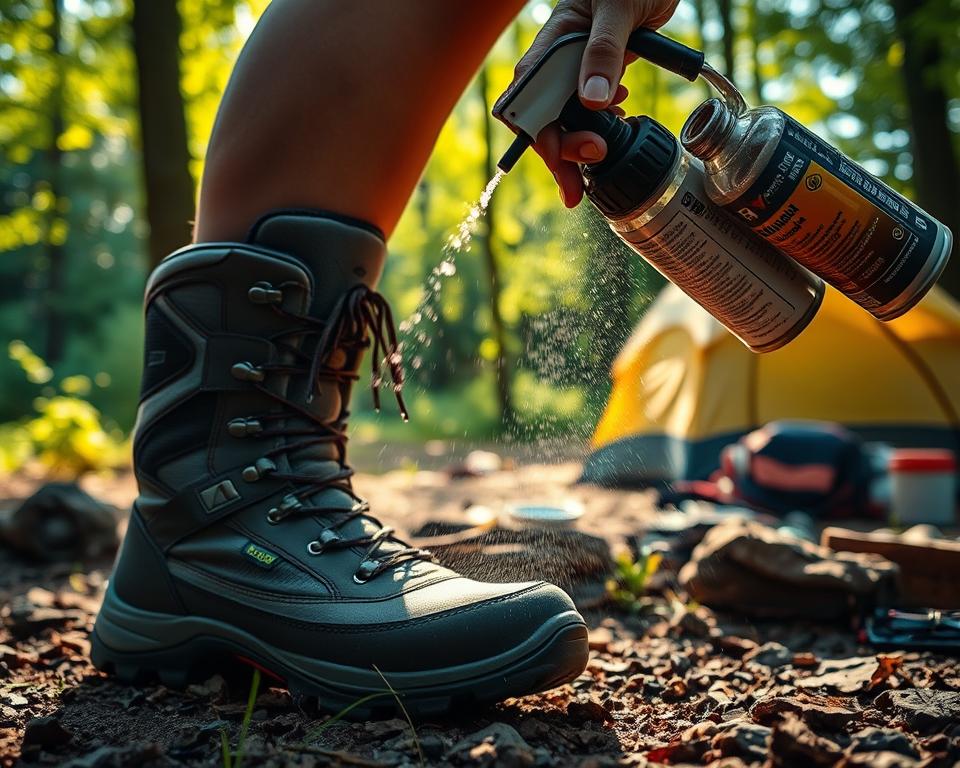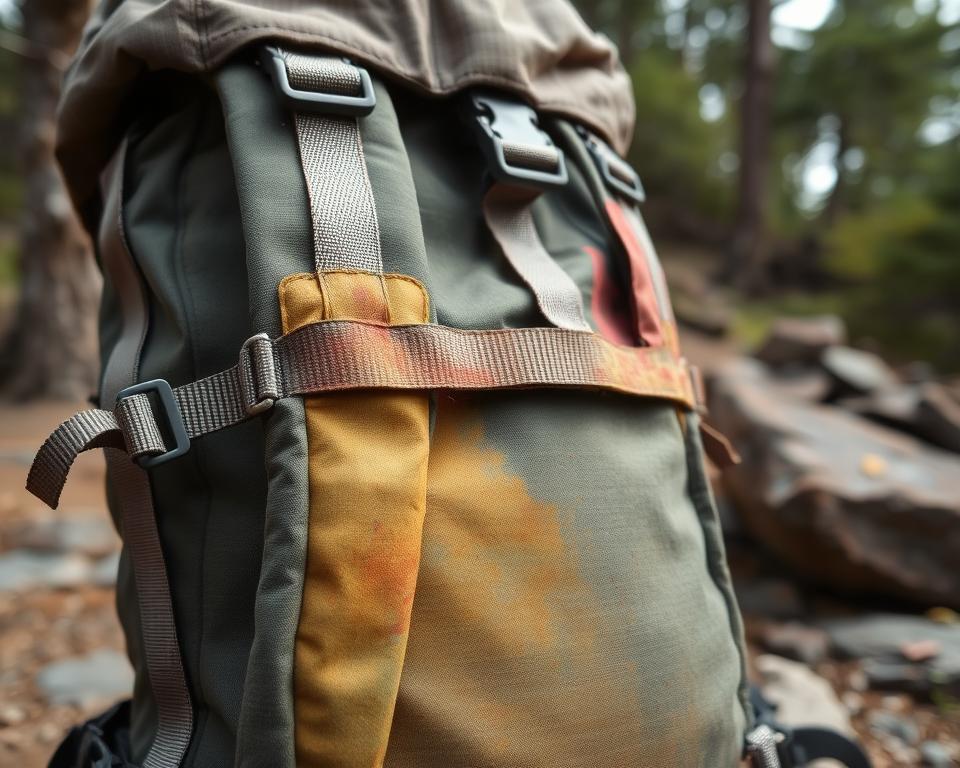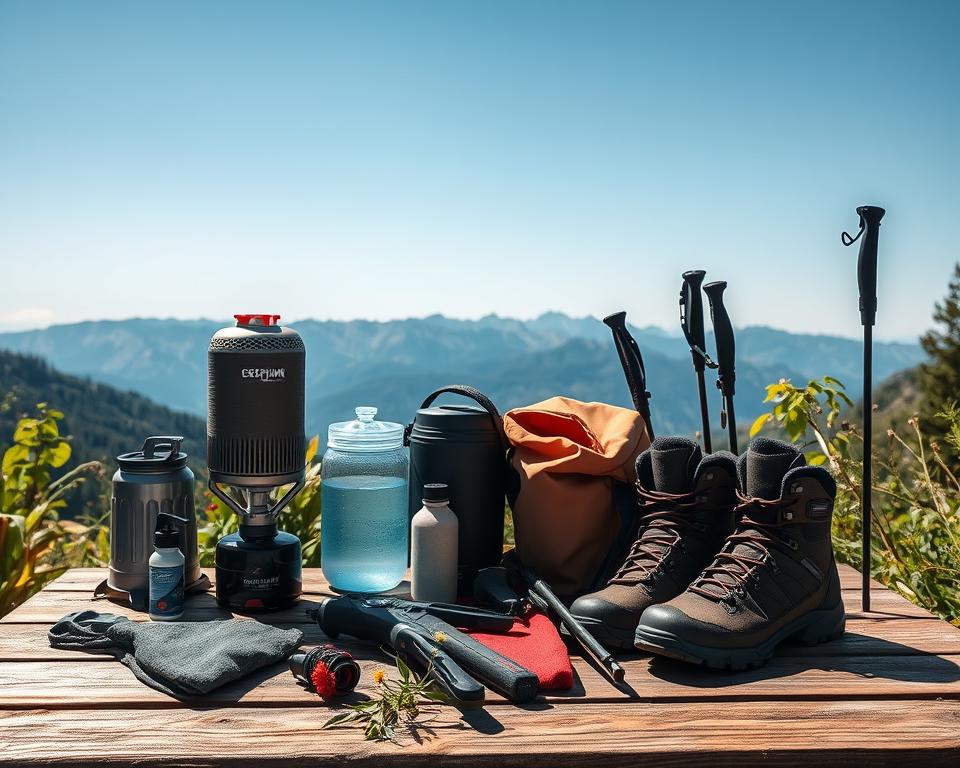Keeping your hiking gear in good shape is key for its durability and function on trails. Proper care of your gear not only improves its lifespan but also its performance when adventuring outdoors.
It’s important to clean regularly and use the right care products. Stay away from harsh chemicals and stick to the maker’s advice. This can make your boots, backpacks, and clothes last longer.
I suggest trying Nikwax for washing and making your gear waterproof again. Regularly check your equipment for damage and fix it quickly. Also, make sure everything is completely dry before storing it. Doing this prevents damage, saves money, and keeps your gear working well.
Storing your gear correctly is crucial, too. Keeping items in bins or hanging them on hooks helps avoid dampness and mildew. Proper storage increases the life and performance of your equipment.
For tips on cleaning camping and hiking equipment, see this detailed guide. It has lots of helpful advice on caring for your outdoor gear.
Taking care of your hiking gear means it will be ready and effective for your trail adventures. This effort betters your hiking experience and ensures you stay safe and efficient while exploring.
Cleaning Your Hiking Gear
Cleaning your hiking gear right is key for keeping it in good shape. It’s all about using the correct cleaners and methods. Doing so makes a big difference.
Choosing the Right Cleaners
Picking the right cleaning products for your gear is vital. For things like jackets and pants, Nikwax Tech Wash works best. It cleans without hurting the water-resistant part of your gear. Down items need something like Nikwax Down Wash to keep them warm.
Pre-treating Stains and Dirt
Dealing with stains before the full wash helps a lot. A mix of OxiClean and water is great for tough spots. It makes dirt easier to clean later. Quick action is important to stop stains from setting in.
Washing and Drying Techniques
After picking your cleaner and treating stains, it’s washing time. Follow the instructions on your gear closely. Don’t use normal laundry soap or softeners; they can damage your gear. For sleeping bags, use a big washer and cold water on a gentle setting.
Dry with low or cool air. For down bags, throw in tennis balls in the dryer. They keep the down from clumping. This way, your bag stays warm. Right drying stops damage and makes your gear last longer.
Regular Maintenance and Care
Taking care of your hiking gear ensures it lasts longer and performs well. This includes checking your gear regularly and making sure it’s waterproof. By doing so, your equipment will always be ready for your next adventure.
Inspecting for Damage
Checking your gear before and after use is crucial. This helps find issues before they become bigger problems. When inspecting, look for tears, frayed seams, and wear signs. Doing this keeps gear in good shape and prepares you for any journey.
Re-Waterproofing Gear
Exposure to rain and snow can reduce how waterproof your gear is. It’s good to re-waterproof it every year or two. You can use products like Nikwax’s TX Direct Wash-In Waterproofing and SolarProof, found at stores like Ski World and Sportcheck. Remember to solar proof your gear in spring and fall to protect it from sun damage.

Drying and Airing Out
Drying and airing out your gear after use is also important. Make sure everything is dry before storing to avoid mildew. Always air out items in a place with lots of air flow. This helps keep your gear in the best condition, preventing moisture-related damage.
Proper Storage Solutions
Storing your hiking gear right can really help it last longer and work better. Good storage keeps things tidy and protects your gear.
Storing in Rubbermaid Bins
Rubbermaid bins are great for small hiking gear. They are strong and keep your stuff safe. Clear bins let you see what’s inside without opening them.
Sorting gear into categories and labeling bins makes it easy to find what you need for your next trip.
Using Hooks for Large Items
Use hooks to store big items like backpacks and sleeping bags. This prevents damage and keeps them in shape. Wall racks or pegboards save space and keep things handy.
Store your gear in a dry place away from the sun to keep it looking and working great.
Group your gear on shelves by type—like cookware, water bottles, clothes, and more. This makes it easy to find and keeps your trips fun and stress-free.
Avoiding Common Mistakes
Keeping your hiking gear in top shape is more than just cleaning it often. It’s also about knowing what not to do. Avoiding these common errors can help your equipment last longer.

Impact of DEET on Gear
Many hikers use DEET-based repellents to keep bugs away. But, DEET can harm your gear. It can melt plastics and damage fabrics. So, it’s crucial to use such repellents with care. Make sure they don’t touch your equipment directly.
Effect of Fabric Softener
Using fabric softener on hiking clothes might seem like a good idea. But, it can actually harm them. Fabric softeners block the technical fabrics’ ability to wick moisture away. They also reduce the clothes’ breathability. To keep your gear in good shape, it’s best to skip the softener.
Sunlight and UV Exposure
UV rays can badly damage your hiking gear. They can cause fading, cracking, and weaken the material overall. Tents and clothes are especially at risk. Protecting your gear from the sun is smart. Products like Nikwax SolarProof can shield your gear. Using UV protection sprays regularly helps keep your equipment strong against the elements.
How to Maintain Your Hiking Gear
Maintaining your hiking gear is key to its long life and performance. Choose high-quality items for the best care and longer use. Picking the right gear and fixing issues quickly will help your gear last longer.
Using Quality Products
For choosing quality gear products, go for trusted brands like Grangers or Nikwax. They have special cleaners to make your gear last and perform better. Grangers Down Wash, for example, cleans sleeping bags safely.
Avoid washing machines that can damage fragile items. Always dry your gear at a low temperature to avoid harm.
Treating and Repairing Damage
Check your gear for damage often and fix it as soon as possible. Patch small tears with tape that has rounded edges. Clean the spot well before you apply the tape for a good repair.
It’s also smart to look after your hiking boots. Clean them well, take out the insoles and laces, and dry everything right. This stops mold and makes your boots last longer. Keep your camp stove in good shape by checking the igniter and storing gas safely to prevent accidents on trips.
By choosing quality gear products and taking care of gear repair early, you ensure a better and safer hiking experience.
When to Repair or Replace Your Gear
Deciding whether to fix or replace equipment is crucial for its function and your safety. Regular checks and taking care can make your gear last longer. But sometimes, you might need to make big changes to keep things safe.
Hiking Boots
Hiking boots need care for your comfort and safety outdoors. Check for sole separations and fix them with Shoe Goo. If the tread wears down, it may be time for new boots. Keep them clean and conditioned to make them last.
Waterproof Shells
Care for your waterproof shells by checking the DWR coating. If water doesn’t bead up, reapply waterproofing with products like Nikwax. But, if there’s serious damage like tears, you might need a new jacket.
Sleeping Bags
Sleeping bags can be fixed to keep them usable. Using down-specific cleaners and storing them properly maintains their warmth. Patch small tears, but a new bag is needed if the fill doesn’t insulate anymore.
Washing your gear every four to five uses prolongs its life. For big repairs, professional help can be a smart choice. Looking after your hiking boots, jackets, and sleeping bags means you’re always prepared to explore.
Conclusion
Throughout our journey exploring hiking gear care, we’ve learned the value of a thorough approach. Starting with cleaning, going through regular upkeep, and onto proper storage, each step helps a lot. It all leads to maximizing gear performance and promotes long-lasting use.
One major point we’ve seen is how crucial timely repairs and smart replacements are. Fixing a tear in your jacket or making gear waterproof again helps extend item life. This not only saves our gear but also protects nature as we enjoy the outdoors. Keeping our equipment in great shape lets us cherish nature’s beauty more, leaving less of a mark and connecting us closer to the paths we love.
Choosing the right products and care methods shows we care about our gear’s longevity. This insight enhances our hiking enjoyment and safety. By sticking to these recommendations, anyone can look forward to many adventures, knowing their gear is up for the challenge. Here’s to years of dependable, eco-friendly, and top-notch hiking adventures!

